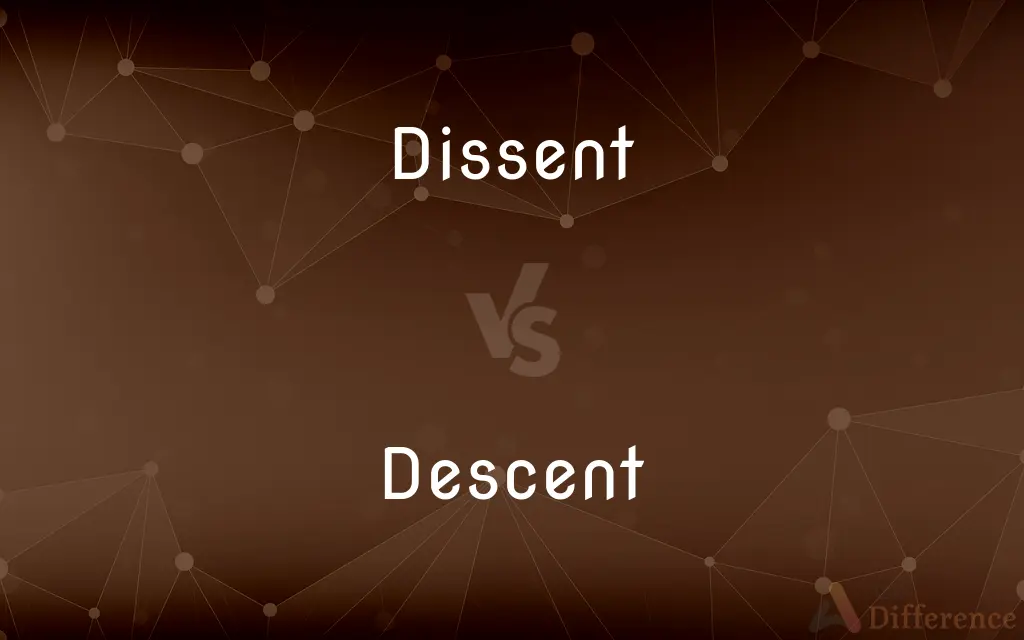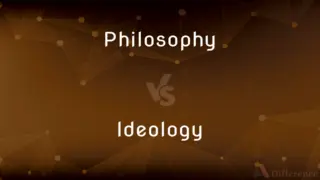Dissent vs. Descent — What's the Difference?
By Urooj Arif & Maham Liaqat — Updated on April 16, 2024
Dissent refers to disagreement or difference of opinion, often in a political or legal context, while descent signifies a movement downward, ancestry, or a decline.

Difference Between Dissent and Descent
Table of Contents
ADVERTISEMENT
Key Differences
Dissent is used to describe the act of expressing a contrary opinion or disagreement, especially in settings like courts, governments, or among groups advocating for various causes. On the other hand, descent refers to the act of going downward, either literally, as in moving to a lower place, or figuratively, in terms of lineage or deteriorating conditions. Both words share a phonetic similarity but differ vastly in meaning and usage.
In legal or parliamentary contexts, dissent is crucial as it allows for the expression of different viewpoints, thereby enriching debate and decision-making processes. Whereas descent is commonly used in genealogy to discuss one's lineage or heritage, tracing back through generations, or in discussions about gradual declines in quality or status.
Dissent can be seen as a positive force in democratic societies, where it is synonymous with freedom of expression and healthy opposition. Descent, in its figurative sense, often carries a negative connotation, particularly when referring to moral, social, or economic decline.
The nature of dissent implies active engagement and participation, as individuals or groups express their opposition to policies or opinions. In contrast, descent is more passive, involving the process of inheritance or the natural consequence of gravity.
While dissent has a dynamic and sometimes confrontational quality, descent suggests a natural progression or transition, whether it is in the context of physical movement, social status, or genetic heritage.
ADVERTISEMENT
Comparison Chart
Definition
Expression of disagreement or opposition
Movement downward; lineage or decline
Usage Context
Legal, political, social advocacy
Physical movement, genealogy, decline
Connotation
Often positive in democracies (freedom of expression)
Often negative (decline), neutral (genealogy)
Associated Actions
Debating, opposing
Inheriting, declining, moving down
Examples in Sentences
"The judge wrote a dissenting opinion."
"He traced his descent from European royalty."
Compare with Definitions
Dissent
Act of rejecting an official opinion.
His dissent from the majority opinion was noted.
Descent
A decline in condition or status.
The descent into poverty was rapid after the factory closed.
Dissent
Express disagreement with an opinion or group.
She voiced her dissent during the meeting.
Descent
The downward slope of a hill.
The bike's brakes failed on the sharp descent.
Dissent
Official disagreement in a judicial decision.
The justice filed a dissenting opinion.
Descent
The act of moving downward.
The descent into the cave was steep and slippery.
Dissent
To differ in sentiment or opinion.
Not everyone will dissent with the popular view.
Descent
Inherited properties or genetics.
His descent was mixed, encompassing several nationalities.
Dissent
Disagreement with prevailing norms.
There was significant dissent regarding the new policy.
Descent
A lowering or decline, as in status or level
Her career went into a rapid descent after the charges of misconduct.
Dissent
(intransitive) To disagree; to withhold assent. Construed with from (or, formerly, to).
Descent
Lineage or ancestry.
Her descent from a revolutionary war hero was well documented.
Dissent
(intransitive) To differ from, especially in opinion, beliefs, etc.
Descent
An act of moving downwards, dropping, or falling
The plane had gone into a steep descent
Dissent
Dissent is an opinion, philosophy or sentiment of non-agreement or opposition to a prevailing idea or policy enforced by a government, political party or other entity or individual in a capacity of contextual authority. A dissenting person may be referred to as a dissenter.
Descent
The origin or background of a person in terms of family or nationality
The settlers were of Cornish descent
Dissent
The holding or expression of opinions at variance with those commonly or officially held
There was no dissent from this view
Descent
A sudden violent attack
A descent on the Channel ports
Dissent
Hold or express opinions that are at variance with those commonly or officially held
Two members dissented from the majority
Descent
The act or an instance of descending
The slow descent of the scuba divers.
Dissent
To have or express an opinion different from a prevailing or official position; disagree.
Descent
A way down
Fashioned a descent with an ice axe.
Dissent
(Law) To reach a conclusion contrary to the majority of the judges deciding a case; render a minority opinion.
Descent
A downward incline or passage; a slope
Watched the stones roll down the descent.
Dissent
Difference of opinion or feeling; disagreement.
Descent
Hereditary derivation; lineage
A person of African descent.
Dissent
The refusal to conform to the authority or doctrine of an established church; nonconformity.
Descent
The fact or process of being derived or developing from a source
A paper tracing the descent of the novel from old picaresque tales.
Dissent
(Law) A judicial opinion reaching a conclusion contrary to that reached by the majority of judges deciding a case; a minority opinion. Also called dissenting opinion.
Descent
(Law) Transmission of property, especially real estate, to a hereditary heir by an intestate owner.
Dissent
(obsolete) To be different; to have contrary characteristics.
Descent
A sudden visit or attack; an onslaught
The descent of the marauders on the settlement.
Dissent
Disagreement with the ideas, doctrines, decrees, etc. of a political party, government or religion.
Descent
An instance of descending; act of coming down.
We climbed the mountain with difficulty, but the descent was easier.
Dissent
An act of disagreeing with, or deviating from, the views and opinions of those holding authority.
Descent
A way down.
We had difficulty in finding the correct descent.
Dissent
(Anglo-American common law) A separate opinion filed in a case by judges who disagree with the outcome of the majority of the court in that case
Descent
A sloping passage or incline.
The descent into the cavern was wet and slippery.
Dissent
(sports) A violation that arises when disagreement with an official call is expressed in an inappropriate manner such as foul language, rude gestures, or failure to comply.
Descent
Lineage or hereditary derivation.
Our guide was of Welsh descent.
Dissent
To differ in opinion; to be of unlike or contrary sentiment; to disagree; - followed by from.
The bill passed . . . without a dissenting voice.
Opinions in which multitudes of men dissent from us.
Descent
A drop to a lower status or condition; decline. en
After that, the holiday went into a steep descent.
Dissent
To differ from an established church in regard to doctrines, rites, or government.
Descent
A falling upon or invasion.
Dissent
To differ; to be of a contrary nature.
Descent
(topology) A particular extension of the idea of gluing. See Descent (mathematics).
Dissent
The act of dissenting; difference of opinion; refusal to adopt something proposed; nonagreement, nonconcurrence, or disagreement.
The dissent of no small number [of peers] is frequently recorded.
Descent
The act of descending, or passing downward; change of place from higher to lower.
Dissent
Separation from an established church, especially that of England; nonconformity.
It is the dissidence of dissent and the protestantism of the Protestant religion.
Descent
Incursion; sudden attack; especially, hostile invasion from sea; - often followed by upon or on; as, to make a descent upon the enemy.
The United Provinces . . . ordered public prayer to God, when they feared that the French and English fleets would make a descent upon their coasts.
Dissent
Contrariety of nature; diversity in quality.
The dissent of the metals.
Descent
Derivation, as from an ancestor; procedure by generation; lineage; birth; extraction.
Dissent
(law) the difference of one judge's opinion from that of the majority;
He expressed his dissent in a contrary opinion
Descent
Progress downward, as in station, virtue, as in station, virtue, and the like, from a higher to a lower state, from a higher to a lower state, from the more to the less important, from the better to the worse, etc.
Dissent
A difference of opinion
Descent
Transmission of an estate by inheritance, usually, but not necessarily, in the descending line; title to inherit an estate by reason of consanguinity.
Dissent
The act of protesting; a public (often organized) manifestation of dissent
Descent
Inclination downward; a descending way; inclined or sloping surface; declivity; slope; as, a steep descent.
Dissent
Withhold assent;
Several Republicans dissented
Descent
That which is descended; descendants; issue.
If care of our descent perplex us most,Which must be born to certain woe.
Dissent
Express opposition through action or words;
Dissent to the laws of the country
Descent
A step or remove downward in any scale of gradation; a degree in the scale of genealogy; a generation.
No man living is a thousand descents removed from Adam himself.
Dissent
Be of different opinions;
I beg to differ!
She disagrees with her husband on many questions
Descent
Lowest place; extreme downward place.
And from the extremest upward of thy head,To the descent and dust below thy foot.
Descent
A movement downward
Descent
Properties attributable to your ancestry;
He comes from good origins
Descent
The act of changing your location in a downward direction
Descent
The kinship relation between an individual and the individual's progenitors
Descent
A downward slope or bend
Descent
The descendants of one individual;
His entire lineage has been warriors
Common Curiosities
What does descent refer to in genealogy?
In genealogy, descent refers to one's lineage or ancestry.
How is dissent used in a legal context?
In a legal context, dissent is used to describe a judge's disagreement with the majority's decision.
What does dissent mean?
Dissent means to express disagreement or opposition.
What is a descent in physical geography?
In physical geography, a descent is the downward slope of a landform.
Is it possible to dissent silently?
Yes, silent dissent can occur through non-participation or subtle forms of protest.
What is meant by a "rapid descent"?
A "rapid descent" usually refers to a quick decline in status or condition.
Can dissent be constructive?
Yes, dissent can be constructive as it encourages diversity of thought and debate.
Is descent always related to decline?
No, descent can also refer to lineage or the act of moving downward, not just decline.
How can dissent manifest in a political context?
Dissent in a political context can manifest as protests, opposition speeches, or voting against a proposal.
Can descent have positive implications?
Yes, when related to ancestry or lineage, descent can have positive implications by connecting individuals to their heritage.
What is the importance of dissent in a democracy?
Dissent is vital in a democracy as it fosters healthy debate, checks majority power, and supports freedom of expression.
Can dissent be a form of patriotism?
Yes, dissent can be seen as a form of patriotism when aiming to improve governance or societal conditions.
What role does descent play in inheritance laws?
Descent plays a crucial role in determining the distribution of estates according to lineage in inheritance laws.
How do people trace their descent?
People trace their descent through genealogical records, DNA testing, and family histories.
What does a descent in social status imply?
A descent in social status implies a decrease in one's social ranking, reputation, or economic position.
Share Your Discovery

Previous Comparison
App vs. Widget
Next Comparison
Philosophy vs. IdeologyAuthor Spotlight
Written by
Urooj ArifUrooj is a skilled content writer at Ask Difference, known for her exceptional ability to simplify complex topics into engaging and informative content. With a passion for research and a flair for clear, concise writing, she consistently delivers articles that resonate with our diverse audience.
Co-written by
Maham Liaqat













































